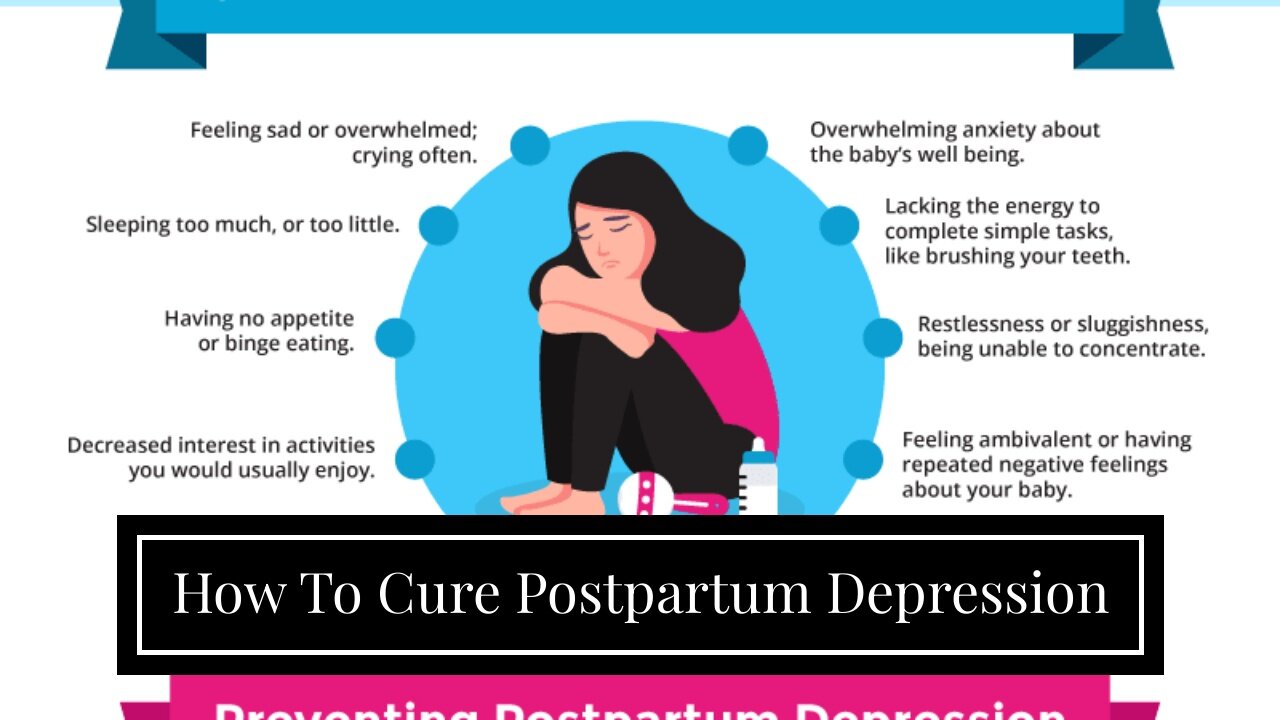Premium Only Content

How To Cure Postpartum Depression
https://www.mrdepression.com/how-to-cure-postpartum-depression/
How To Cure Postpartum Depression
How To Cure Postpartum Depression: Causes, symptoms, and treatments Depression is a mental health disorder that can affect anyone, at any time in their lives. However, postpartum depression is a specific type of depression that can occur after the birth of a child. While it’s normal to feel some sadness and anxiety after giving birth, postpartum depression lasts longer and is more severe.
It’s estimated that 1 in 9 women experience postpartum depression in the United States. If you’re a new mother struggling with feelings of sadness, despair, or hopelessness—or if you have thoughts of harming yourself or your baby—seek professional help right away. Postpartum depression is treatable, and with the right help, you can feel better and bond with your baby. What is postpartum depression? Postpartum depression (PPD) is a type of clinical depression that can occur after the birth of a child. It’s often mistaken for the “baby blues,” which are temporary and milder emotional symptoms many women experience after childbirth (more on this later). PPD affects new mothers—as well as fathers and adoptive parents—and can develop anytime during the first year post-delivery. The cause of PPD isn’t fully understood but may be due to hormonal changes, sleep deprivation, changes in diet, or other physical changes that occur after having a baby. Genetics may also play a role; if someone in your family has suffered from PPD or another mood disorder, you may be more likely to experience it yourself. Symptoms of postpartum depression The main symptom of PPD is intense sadness that doesn’t go away within two weeks after giving birth. But there are other signs and symptoms to look out for as well:
Feeling overwhelmed
Excessive crying
Difficulty bonding with your baby
Withdrawing from friends and family
Loss of interest in activities you used to enjoy
Lack of energy
Sleeping too much or not being able to sleep
Appetite changes
Anger or irritability
Panic attacks
Feelings of worthlessness or guilt
Thoughts of harming yourself or your baby
Unexplained aches and pains So how to cure postpartum depression? If you have any concerns about how you’re feeling after having a baby—no matter how mild—talk to your doctor right away.
Many new mothers feel guilty about admitting they’re anything less than ecstatic about their newborns, but it’s important to remember that PPD is common and nothing to be ashamed about seeking help for. The sooner you get treatment for PPD ,the better chance you have at making a full recovery .
There’s no shame in getting help when dealing with something as difficult as PPD. When you need to learn how to cure postpartum depression, your doctor can refer you to counseling or support groups ,or prescribe medication if necessary. And know that with treatment ,PPD is very treatable.You’ll likely find relief from your symptoms within several weeks .But again ,the sooner you seek treatment ,the better off you ‘ll be .If left untreated ,PPD can last for months —or even years —so don’t delay getting the help you need.
There are many ways to treat postpartum depression, and the most effective approach depends on the severity of your symptoms. In mild cases, self-care measures such as getting regular exercise, eating a nutritious diet, and getting enough sleep may be enough to ease your symptoms. If your symptoms are more severe, you may need medication or therapy (or both).
The most common type of medication used to treat PPD is antidepressant medication. Selective serotonin reuptake inhibitors (SSRIs) are often prescribed because they’re considered safe for use during breastfeeding. SSRIs work by increasing levels of serotonin in the brain, which can improve mood. Common SSRIs used to treat PPD include sertraline (Zoloft) and fluoxetine (Prozac).
If you’re not interested in taking medication or if it doesn’t help ease your symptoms, there are other options. Psychotherapy—either individual or group therapy—can be an effective treatment for PPD. Cognitive behavioral therapy (CBT) is a type of psychotherapy that can help you identify and change negative thoughts and behaviors that contribute to PPD. Other types of therapy such as interpersonal therapy (IPT) can also be helpful in treating PPD by teaching you how to communicate better and deal with difficult emotions.
In severe cases of PPD, hospitalization may be necessary so that you can b...
-
 LIVE
LIVE
The Quartering
2 hours agoElon Musk's 13th Baby, Trump Attends Daytona 500, and Ramaswamy Enters the Ohio Governor's Race
5,459 watching -
 1:28:04
1:28:04
Russell Brand
2 hours agoBREAKING: UK Troops To Ukraine | Zelensky Wants “Army Of Europe” | JD Vance SLAMS EU Tyranny – SF538
61.2K31 -
 1:46:20
1:46:20
Benny Johnson
3 hours agoPANIC: Feds FLEE DC After Mass PURGE, Fired USAID Activists EXPOSED | Trump DOMINATES Daytona 500
74.7K53 -
 1:58:43
1:58:43
The Charlie Kirk Show
2 hours agoCBS Steps In It + Hockey Brawl + Judicial Standoff | Yoo, Schlapp, BigTree | 2.17.2025
54.5K9 -
 1:01:26
1:01:26
The Dan Bongino Show
5 hours agoTrump Is Cancelling DEI And Cancel Culture (Ep. 2424) - 02/17/2025
595K1.24K -
 1:06:12
1:06:12
Timcast
4 hours agoDemocrat Swamp IMPLODES, CBS Runs DAMAGE Control For Democrats, Gets ROASTED By Elon | Timcast LIVE
101K111 -
 2:00:58
2:00:58
RealAmericasVoice
10 hours agoWAR ROOM WITH STEVE BANNON AM EDITION
84K17 -
 2:59:47
2:59:47
Wendy Bell Radio
9 hours agoAmerica Drops The Gloves
87.4K54 -
 1:22:27
1:22:27
Steven Crowder
4 hours agoGeorge Washington, Our First President | 3 in 3 Special
264K160 -
 1:03:57
1:03:57
Kyle Fortch
5 hours ago $1.01 earnedDJ Chill: DJing For Jelly Roll, SOLD OUT Tour, Performing at Hometown Arena | THE ONE SHEET S1E4
39K3